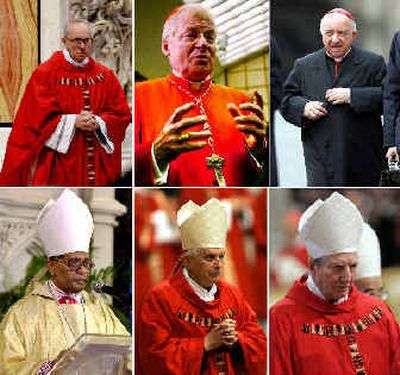Cardinals” dirty laundry gets airing in papal election

VATICAN CITY – Accusations of involvement in kidnappings of priests in Argentina dog one papal contender. “Revelations” about Nazi links surface about another top candidate. Gossipy items about health problems raise doubts about others.
Like a U.S. presidential campaign, the run-up to the election of a pope has seen some dirty laundry hung out in public, and it’s not the cardinals’ red socks that are getting an airing.
Among the “princes of the church” being targeted was German Cardinal Joseph Ratzinger, one of Pope John Paul II’s most trusted aides and a man some Vatican watchers have put in the pole position in the race to be pope.
Journalists have been poking around Ratzinger’s teenage years during World War II, apparently searching for evidence of any pro-Nazi sentiment.
And on Friday, Argentine Cardinal Jorge Bergoglio was cited in a criminal complaint alleging involvement in the 1976 kidnappings of two fellow Jesuits during Argentina’s dark years of military dictatorship. The cardinal’s spokesman called the allegation by a human rights lawyer “old slander.”
Closet doors are being yanked open in efforts to shape the fortunes of those in the conclave, which began Monday with a first, inconclusive vote.
Also being swept out in the search for dirt are purported health problems.
The Corriere della Sera’s daily column on the rise and fall of pre-conclave fortunes noted the “small pieces of gossip tossed out there with apparent nonchalance but which translate into little bombs.”
Among the potential bombshells was an item in the communist daily Il Manifesto that Venice Cardinal Angelo Scola’s future “could be burned for health reasons” over allegations he suffers strong headaches and “nervous depression.”
Cardinals and their aides closely monitor the Italian media. But now that they have been sequestered in Vatican City since Sunday night, the electors aren’t allowed to follow the news under strict rules set by John Paul to discourage outside influence.
Other Italian reports said Bombay Cardinal Ivan Dias, who is seen as a long-shot candidate, has diabetes. They later reported that a priest who spoke with the 69-year-old Dias said the reports were wrong.
Several reports noted that the former archbishop of Milan, Cardinal Carlo Maria Martini, has a tremor that could be a sign of Parkinson’s disease.
Martini has been widely mentioned as a possible “anti-candidate” to counter Ratzinger.
The 78-year-old German cardinal is a hero to doctrinal conservatives, while liberal camps are supposedly rooting for Martini, who is considered more open-minded.
A Sunday Times of London profile on Ratzinger, saying his doctrinal watchdog role has earned him uncomplimentary nicknames like “God’s Rottweiler,” reported on the cardinal’s “brief membership” in the Hitler Youth movement and service, in the final stretch of World War II, in a German anti-aircraft unit.
In his memoirs, Ratzinger speaks openly of being enrolled in the Nazi youth movement against his will when he was 14 in 1941, when membership was compulsory. He says he was soon let out because of his studies for the priesthood.
Two years later he was drafted into a Nazi anti-aircraft unit as a helper, a common fate for teenage boys too young to be soldiers. Enrolled as a soldier at 18, in the last months of the war, he barely finished basic training.
Web sites, presumably propelled by Ratzinger supporters, churned out articles in his defense, including one by the Jerusalem Post seeking to knock down much of the Times’ harsh description of the cardinal’s background.
Also sharply attacked in recent days has been another Italian contender, Milan Cardinal Dionigi Tettamanzi, with detractors insisting he isn’t the down-to-the-bone conservative many see him as.
But Tettamanzi’s star was already seen as falling years ago by those whose credo is the oft-cited Italian proverb: “He who enters the conclave a pope comes out a cardinal.” That camp contends the buzz on Tettamanzi began too soon to sustain enough support for him into the conclave.
Similarly, some suspect that reports Ratzinger had gained wide consensus in the days ahead of the vote were a tactic by those who wanted to shoot down his star. With cardinals refusing interviews in the last days before the conclave, none of the Italian reports cited any sources.